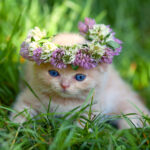Are carnations toxic to cats
Cats are beloved companions, and responsible pet owners are always cautious about the safety of the environment in which their feline friends live. One common concern is the presence of certain plants and flowers that may be toxic to cats. Carnations, known for their vibrant and diverse colors, are a popular choice in floral arrangements. However, pet owners often wonder whether these beautiful flowers pose any threat to their cats. In this article, we will explore the safety of carnations for cats and provide guidance on keeping your pets out of harm’s way.
Carnation Basics:
Carnations, scientifically known as Dianthus caryophyllus, are a species of flowering plants native to the Mediterranean region. These flowers are prized for their appealing fragrance and long-lasting blooms, making them a popular choice for various occasions, from weddings to celebrations. Available in a spectrum of colors, including white, pink, red, and purple, carnations are versatile and often used in floral arrangements and bouquets.

Understanding Toxicity:
To determine whether carnations are toxic to cats, it’s crucial to examine the potential toxic components within the flower. According to the American Society for the Prevention of Cruelty to Animals (ASPCA) and other veterinary resources, carnations are generally considered non-toxic to cats. This means that if a cat ingests or comes into contact with carnations, it is unlikely to cause severe harm.
However, it’s important to note that while carnations are generally safe, certain factors may affect individual cats differently. Cats with sensitive stomachs or allergies may experience mild gastrointestinal upset if they consume any part of the carnation plant. Additionally, the risk of toxicity increases if the carnations have been treated with pesticides or other chemicals.
Preventive Measures:
While carnations are generally safe for cats, responsible pet ownership involves taking preventive measures to ensure the well-being of your feline companions. Here are some tips to keep your cats safe around carnations:
- Choose Organic or Untreated Carnations: When purchasing carnations for your home, opt for organic or untreated varieties. This reduces the likelihood of exposing your cats to harmful chemicals used in pesticides or fertilizers.
- Monitor Your Cat’s Behavior: Keep a close eye on your cat when introducing carnations into your home. Monitor their behavior and look for any signs of distress, such as vomiting, lethargy, or changes in appetite. If you notice any unusual symptoms, consult with your veterinarian promptly.
- Place Carnations Out of Reach: To prevent accidental ingestion, place carnations in areas that are inaccessible to your cats. Consider using elevated surfaces or hanging arrangements to keep the flowers out of paw’s reach.
- Educate Yourself on Other Toxic Plants: While carnations are generally safe, it’s essential to be aware of other plants that can be harmful to cats. Some common toxic plants include lilies, azaleas, and philodendrons. Familiarize yourself with potential dangers to create a safe living environment for your feline friends.
Are hydrangeas poisonous to cats
Hydrangeas are popular ornamental plants known for their large and vibrant flower heads. These beautiful blooms make hydrangeas a common choice for gardens and floral arrangements. However, when it comes to the safety of our pets, particularly cats, concerns may arise about the potential toxicity of hydrangeas.
Hydrangeas contain substances called cyanogenic glycosides, which can release hydrogen cyanide when ingested. This compound is toxic to both humans and animals, affecting the respiratory and cardiovascular systems. While the concentration of cyanogenic glycosides in hydrangeas is not extremely high, it’s essential for cat owners to be aware of the potential risks.
Cats, known for their curious nature, may be tempted to nibble on plants in and around the house. If a cat ingests hydrangea leaves or flowers, it can lead to symptoms of poisoning. Common signs of hydrangea poisoning in cats include vomiting, diarrhea, lethargy, difficulty breathing, and, in severe cases, cardiovascular collapse.
It’s crucial for cat owners to be proactive in preventing their feline friends from accessing hydrangeas. Placing hydrangea plants out of reach and opting for pet-friendly alternatives in gardens and bouquets can help reduce the risk of accidental ingestion.
In the event that a cat shows symptoms of hydrangea poisoning, immediate veterinary attention is necessary. The veterinarian may induce vomiting, administer activated charcoal to absorb toxins, and provide supportive care such as intravenous fluids and medications to address specific symptoms.
While hydrangeas can pose a risk to cats, it’s essential to note that not all cats will react the same way to exposure. Factors such as the amount ingested, the cat’s size, and individual sensitivity can influence the severity of the poisoning. Nevertheless, the potential dangers warrant caution and responsible pet ownership.
Pet owners should educate themselves about the toxicity of plants commonly found in and around their homes. This knowledge can help create a safe environment for pets, minimizing the chances of accidental poisoning. Additionally, consulting with a veterinarian about safe and pet-friendly plant options for the home and garden can contribute to a healthier and happier living space for both cats and their owners.
In conclusion, hydrangeas do contain substances that can be toxic to cats, and pet owners should take precautions to prevent accidental ingestion. Creating a pet-safe environment involves understanding the potential risks associated with common household plants and taking steps to minimize those risks. While hydrangeas add beauty to our surroundings, responsible pet ownership means prioritizing the well-being of our furry companions and making informed choices to keep them safe from potential hazards.
Conclusion:
In conclusion, carnations are generally considered non-toxic to cats, making them a safer choice for households with feline companions. However, responsible pet ownership involves awareness and preventive measures. Choosing organic or untreated carnations, monitoring your cat’s behavior, placing flowers out of reach, and educating yourself on toxic plants are essential steps to ensure the well-being of your beloved pets. By taking these precautions, you can enjoy the beauty of carnations in your home while keeping your cats safe and happy.
References;
Exploring the Impact of Carnations on Feline Health: Are Carnations Toxic To Cats?
https://basepaws.com/blog/exploring-the-impact-of-carnations-on-feline-health-are-carnations-toxic-to
Are Hydrangeas Poisonous To Cats?
https://www.southernliving.com/culture/pets/are-hydrangeas-poisonous-to-cats

